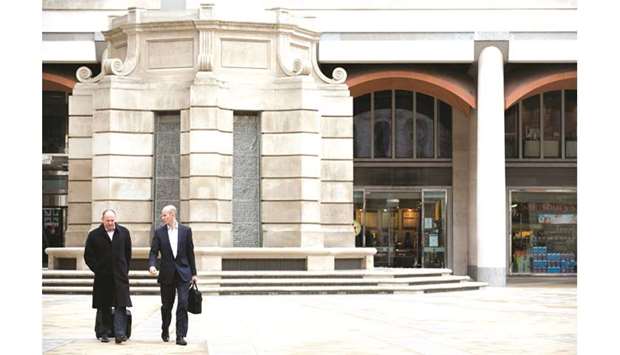European equities climbed yesterday as traders welcomed a Bloomberg News report that the United States and China were still moving towards a possible trade deal, dealers said.
Oil prices also rose as other reports characterised the Organisation of the Petroleum Exporting Countries as trending towards a production agreement to cut production further to boost oil prices.
“This morning’s rebound has gained a little more traction on reports that, despite the heating up of rhetoric over trade, the US and China are moving closer to agreeing a deal on the amount of tariffs that would be rolled back in any phase one trade deal,” said CMC Markets analyst Michael Hewson.
Bloomberg quoted people familiar with the talks as saying that US negotiators saw a deal being finalised before US tariffs against China are due to rise on December 15.
They said that issues still outstanding include “how to guarantee China’s purchases of US agricultural goods and exactly which tariffs to roll back.”
New York’s Dow Jones index showed a gain of 0.8% in midday trading.
On Tuesday, US President Donald Trump upended markets when he appeared unconcerned about the chances of a deal with China by the end of the year.
But yesterday, London’s benchmark FTSE 100 index of major blue-chip firms was up by 0.4% at 7,188.50 points, its gains capped by a surging pound that weighed on London-listed multi-nationals whose earnings abroad are converted back into sterling.
The pound jumped to its highest level since May 2017 against the euro on news that British Prime Minister Boris Johnson’s Conservatives were leading in opinion polls ahead of a general election on December 12.
In eurozone trades, Frankfurt added 1.2% to 13,140.57 points while Paris gained 1.3% to 5,799.68 points.
The EURO STOXX 50 closed 1.4% up at 3,660.02 points.
“Stock market sentiment has started to stabilise despite the ongoing trade rumbles,” said IG analyst Joshua Mahony.
After weeks of broad optimism — and White House claims — that the economic superpowers were close to a partial agreement, the president said Tuesday that he could be happy to wait until after next year’s vote.
“I have no deadline,” Trump told reporters. “In some ways, I like the idea of waiting until after the election for the China deal.”
CMC Markets analyst Michael Hewson injected a note of scepticism however, saying Wednesday: “one can’t help feeling that US officials appear to be gaming the market, and that despite the change in tone any deal is no closer than it was 24 hours ago.
“We’ll probably only know for sure as we get closer to the 15th of December,” he concluded.
Meanwhile, Asian investors extended a sell-off in global markets yesterday.
Hong Kong, Tokyo and Sydney all lost more than one percent, while Shanghai, Mumbai, Taipei and Bangkok each shed 0.2%.
Singapore dropped 0.6 percent, Seoul fell 0.7 percent, Manila slipped one percent and Jakarta sank 0.5%.
“While the trade mood music can change very quickly, events over the past 48 hours have forced a reassessment in terms of what to expect before the end of the year,” said Rodrigo Catril at National Australia bank.
“Tariff man is back and he has brought market volatility back to life.”
“It’s very difficult to have conviction about which way the trade situation will go,” Laura Kane at UBS Global Wealth Management told Bloomberg TV.
“Just a few weeks ago the news was incrementally positive, now we’ve moved more negative again, but the situation is going to stay in flux as we enter next year.”
The uncertainty sent investors running for safe-haven assets with the yen holding Tuesday’s gains against the dollar, while gold pushed towards $1,500 and its highest levels since 2013.
Higher-yielding, riskier currencies were down against the greenback with the Chinese yuan, South Korean won and Australian dollar among those suffering a sell-off.

Pedestrians walk across Paternoster Square in front of the London Stock Exchange Group headquarters. The FTSE 100 index of major blue-chip firms closed 0.4% up at 7,188.50 points yesterday.
